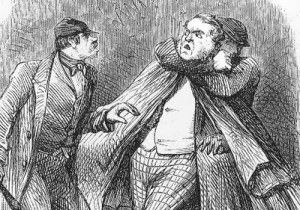Brutal Tax Assault on Internet Sales
By JOHN SEILER
California’s tax-increase cult is lobbying to grab every last dollar it can tax — the future of the state be damned. The drumbeat is daily. I wrote yesterday how all three top Los Angeles Times columnists came out, simultaneously, for higher taxes.
Even as I was writing, the California Budget Project — better termed the California Tax-Increase Project — came out with a new study: “Narrowing the Gap: Options for Boosting California’s Sales Tax Collection from Online Retailers.” It begins:
California loses more than $1 billion each year in uncollected taxes on Internet sales because out-of-state online retailers refuse to collect the taxes owed on consumers’ purchases.
That $1 billion figure will get Gov. Jerry Brown and Democratic legislators salivating like Pavlov’s dog. It’s another billion they could waste on special interests, such as the bloated pensions of government workers that funded their election campaigns.
Except that, as even this study noted, not much money can be collected without action by by the U.S. Congress. The study accurately described the problem:
A series of US Supreme Court rulings has limited states’ ability to require out-of-state retailers to collect the sales tax owed on purchases of taxable goods by consumers that in-state retailers are legally obligated to collect. The grounds for these decisions rest on the Court’s interpretation of a provision of the US Constitution commonly referred to as the Commerce Clause. This provision explicitly reserves to Congress the power to regulate interstate commerce and has been interpreted by the Court to also prohibit certain state actions that interfere with interstate commerce. Court decisions have determined that states can levy taxes on businesses without violating the Commerce Clause as long as certain conditions are met, including that that the tax applies to businesses with a signifi cant connection to the state — referred to as “substantial nexus.”
The study conceded, “Until Congress acts, states’ ability to close their sales tax gaps is somewhat limited.” And it noted,
several states have enacted laws in recent years aimed at boosting sales tax collections by out-of-state retailers. Further state action could spur Congress to implement a comprehensive solution to the problem.
What the study didn’t note was that Congress is unlikely to act. It didn’t act when Democrats controlled both houses of Congress from 2007 to 2010. And now that anti-tax Republicans have taken over control of the House, and likely will hold the House after the 2012 election, there is zero chance that tax legislation would passed to allow such state tax increases.
Getting Around the Law
But that didn’t stop the California Budget Project from boosting ways around the law:
New York led the way in 2008 with an innovative law that requires out-of-state retailers to collect the sales tax on all purchases made by the state’s consumers if those retailers use “affi liates” in the state to promote their sales.
The law assumes that online retailers’ relationship with affi liates constitutes a “physical presence” in New York that entitles the state to require those companies to collect the sales tax. The Appellate Division of the New York Supreme Court has upheld the law. New York officials estimate that approximately 30 retailers began collecting state and local sales tax as a result of the legislation, boosting collections by more than $100 million in two years.
That ought to get California politicians’ Pavlovian tax glands salivating. The study continued:
Encouraged by the success of New York’s approach, several other states, including Arkansas, Illinois, North Carolina, and Rhode Island have enacted legislation modeled after New York’s law, and at least 10 additional states, including California, are considering similar measures. A bill currently before California’s Legislature, AB 153 (Skinner), is modeled after New York’s law.
The Rest of the Story
But there’s more to it than what is included in the study. The New York assault on Amazon remains on appeal. In the meantime, numerous online retailers already have fired their affiliates, including: Baby Universe, Backcountry.com, Binoculars.com and Bodybuilding.com.
That means New York just destroyed dozens of little businesses, many “Mom and Pop” affiliates, that had been good citizens, and which paid other taxes to the state, such as property and income taxes.
Amazon has threatened that, if it loses its appeal, it also will fire its Empire State affiliates.
The California Budget Project study mentioned Illinois going after affiliates. But Amazon already fired its affiliates there. As Amazon wrote in a letter to those fired in March:
We had opposed this new tax law because it is unconstitutional and counterproductive. It was supported by national retailing chains, most of which are based outside Illinois, that seek to harm the affiliate advertising programs of their competitors. Similar legislation in other states has led to job and income losses, and little, if any, new tax revenue. We deeply regret that its enactment forces this action.As a result of the new law, contracts with all Illinois affiliates of the Amazon Associates Program will be terminated and those Illinois residents will no longer receive advertising fees for sales referred to Amazon.com, Endless.com , or SmallParts.com.
I wrote about this attack on California affiliates last month in “Suicidal California Amazon Tax.” I noted that the best estimates showed that only $152 million would be collected should the affiliates be taxed here. But $124 million would be lost in income taxes because Amazon (and other stores) would fire their affiliates. Net tax income: $24 million. That’s less than $1 for every Californian.
And I also noted that, in a state that remains the global center of the Internet, we should promote frictionless Internet commerce. The more the Internet is used, the more people use products and services from our companies: Facebook, Intel, Apple, Conexant, Google, Cisco, Broadcom and thousands more.
It’s suicidal to harm California businesses to benefit other businesses — such as Barnes & Noble and Walmart — headquartered in other states.
If the Internet becomes clogged with complicated tax rules, with states poaching on each other, then there will be less Internet activity — and so reduced business for California Internet businesses. And reduced business would mean a lower tax base, resulting in fewer taxes being collected.
It’s impossible to quantify, but I think if California imposes any special taxes on Internet commerce, as the California Tax-Increase Project wants, tax receipts actually would decline.
Perceptive Comment
Even though my article came out a month ago, earlier today a person named Sean Roberts left this perceptive comment:
As a progressive, I totally agree that this bill will only destroy in-state internet publishers of all sizes, who depend on affiliate ad sales for income in the same way that newspapers and broadcast TV rely on ad sales for their income. Taxing sales generated through ads on California-based websites makes as much sense as trying to tax sales made by out-of-state companies which advertise in local newspapers or on local TV stations. Of course this latter type of sales tax would never fly if only due to the lobbying clout of the print and TV media.
Amazon and other affiliate ad networks will simply stop allowing affiliate ads on California-based content websites, killing many in-state businesses. The sales will still be made through Amazon, only no ad revenue will be paid to California webmasters. The state will lose that income tax revenue, while the websites will likely go out of business.
As a website owner, I know the ins and outs of the business. Faced with the loss of all my advertisers, my sites would be forced to move out of state or close. Almost every other California based professional web publisher will face this same problem. How will this possibly end up in a net gain of any sort for the state treasury? It won’t.
This is a law conceived by incompetent and/or corrupt legislators who make no attempt to grasp the intricacies of how web advertising works. Just the fact that Barnes and Noble is mentioned as a “replacement” for Amazon ads shows just how little these legislators understand the web publishing industry. Only a very small percentage of Amazon affiliate ads promote BOOKS these days. Instead, these ads promote every other product under the sun. As a result, Barnes and Noble would be unable to pick up 99% of the ad revenue that would be lost if Amazon and other affiliate ad networks (like Shareasale and Commission Junction) were to dump California websites, as they have promised to do in the event this bill passes.
Sure there needs to be sales tax equity, but his is an issue that needs to be addressed at the Federal level. Walmart is the main force lobbying for this bill in CA and other states. They could care less about the havoc such poorly conceived legislation will wreck — their sole intent is to wage war on Amazon.
That’s what’s really going on. This is a battle among retail giants using tax policy to hit one another. The little folks — the Mom and Pop affiliates that would be destroyed by the tax increases the California Budget Project is obsessed with — would be just collateral damage.
I’m always shocked how those who say they’re for the little guy end up slamming him up against a wall, punching and kicking him, grabbing his wallet and leaving him on the concrete, bleeding and convulsing.
Related Articles
Villaraigosa will not pursue 2016 Senate seat
Former Los Angeles Mayor Antonio Villaraigosa announced he won’t challenge state Attorney General Kamala Harris for the U.S. Senate seat
Reid retirement provides lessons for both CA Democrats and GOP
Physically injured and in his 75th year, Senate Democratic Leader Harry Reid, D-Nev., has opted against seeking reelection in 2016. Victim
LAO Says Zero Out AB 32 Funding
MAY 4, 2011 California’s Global Warming Solutions Act of 2006 is in every sense of the word a landmark piece





